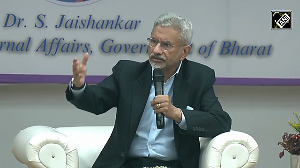Telecommunication companies buying airwaves in an Indian auction next month will pay 5 per cent of their revenue as an annual fee, a ministerial panel decided on Monday, a move that means lower payments for bigger carriers Bharti Airtel and the Indian unit of Vodafone. The move scraps the 3-8 per cent fee range the country currently levies in an effort to coax previously reluctant operators into taking part in India's third attempt at auctioning two frequency bands for billions of dollars.
The move scraps the 3-8 per cent fee range the country currently levies in an effort to coax previously reluctant operators into taking part in India's third attempt at auctioning two frequency bands for billions of dollars.
The new rate is higher than the 3 per cent flat rate suggested by an independent sector regulator, which had proposed abolishing the current levy of five different rates depending on the quantum of spectrum held by a carrier.
The government may lose some revenue it collects as annual fees due to the new rate, Telecommunications Minister Kapil Sibal said after the meeting of the ministerial group, but expects it to help companies buy more spectrum in the auction starting February 3.
"No big losers, no big winners," Sibal said. "A successful auction means greater investment in the sector," he said, explaining the rationale for the new rate.
After two previous attempts to pull off the sale were boycotted by major mobile phone operators that complained minimum bid prices were too high, India cut sharply the floor bid price for the February auction, helping it lure interest from eight carriers including the market leaders.
That still did not guarantee a successful sale as carriers including Bharti and Vodafone demanded a cut in the recurring annual fee they pay on the top of the winning bid price for using airwaves. India expects to raise at least $1.8 billion this year from the spectrum auction.
"I think it's a mixed blessing. We are pleased that it's capped at 5 per cent," said Rajan Mathews, director general at the Cellular Operators' Association of India after the ministerial panel's decision on Monday.
Bharti and Vodafone must buy spectrum in the February auction to renew their permits in some key cities and are expected to benefit from the 5 per cent cap because they currently pay around 6 per cent of their revenue in annual fees in those markets.
But smaller carriers that pay less than 5 per cent currently, will tend to move towards the 5 per cent rate gradually if they buy more spectrum from the auction, Mathews said.
The total spectrum fee for carriers' existing spectrum and new spectrum from the February auction will be calculated based on a weighted average of the old and new fee, Sibal said.
Sibal said companies like Reliance Industries Ltd, which bought 4G spectrum in a 2010 auction, will continue to pay 1 per cent of their revenue as annual fee for that spectrum.
Reliance, which is also bidding in the February auction, had opposed any change in the fee for 4G spectrum.












 © 2025
© 2025